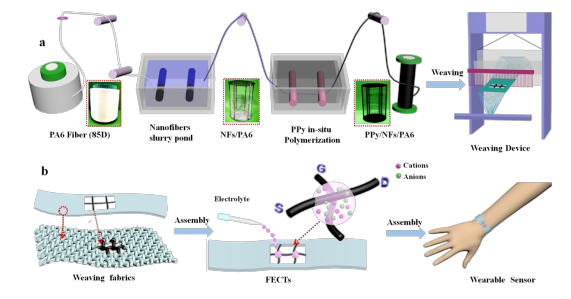Wearable Fiber-Based Organic Electrochemical Transistors as a Platform for Highly Sensitive Dopamine Monitoring
ABSTRACT: Fiber-based organic electrochemical transistors (FECTs) provide a new platform for the realization of an ultrafast and ultrasensitive biosensor, especially for the wearable dopamine (DA)-monitoring device. Here, we presented a fully fifilament-integrated fabric, it exhibited remarkable mechanical compatibility with the human body, and the minimum sensing unit was an organic electrochemical transistor (OECT) based on PVA-co-PE nanofifibers (NFs) and polypyrrole (PPy) nanofifiber network. The introduction of NFs notably increased the specifific surface area and hydrophilicity of the PA6 fifilament, resulting in the formation of a large area of intertwined PPy nanofifiber network. The electrical performance of PPy nanofifiber network-modifified fifibers improved considerably. For the common FECTs, the typical on/offff ratio was up to two orders of magnitude, and the temporal recovery time between on and offff states was shortened to 0.34s. Meanwhile, the device exhibited continuous cycling stability. In addition, the performances of FECT-based dopamine sensors depending on difffferent gate electrodes have also been investigated. The PPy/NFs/PA6 fifilament-based dopamine sensor was more superior to the gold and platinum (Pt) wires, and the sensor presented long-term sensitivity with a detection region from 1 nM to 1 μM, rapid response time to a set of DAconcentrations, remarkable selectivity in the presence of sodium chloride, uric acid, ascorbic acid and glucose, and superior reproducibility. Moreover, it could also be woven into the fabric product. The novel and wearable FECT device shows the potential to become the state-of-the-art DA-monitoring platform.
Qing Xing, et al.Wearable fiber-based organic electrochemical transistors as a platform forhighly sensitive dopamine monitoring. ACSapplied materials & interfaces, 2019, 11, 13105-13113.
